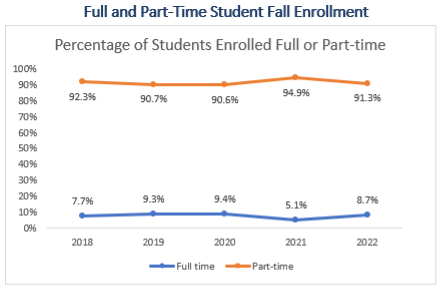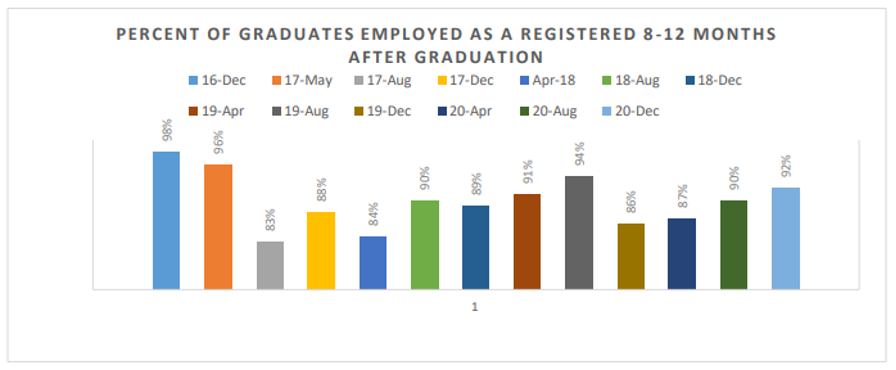The Office of Institutional Effectiveness supports a coordinated process to plan and enact strategies based on data that has been critically interpreted and discussed widely.
The office facilitates this process, which is responsive, timely, and grounded in a shared commitment to the learning outcomes for Labouré students and the mission of the college.
Review our Enrollment and Student Demographic data, and our Student Achievement data below.
Mission
To be the resource for information and insight that advances institutional quality by facilitating effective assessment processes and by providing Labouré College of Healthcare with accurate and reliable information for evidence-based planning decisions with the goal of creating tools to drive student success and inspiring a culture of continuous improvement.
Planning and Continuous Quality Improvement
The Office of Institutional Effectiveness advances and supports successful action planning and continuous quality improvement through the following activities and initiatives.
- Maintaining compliance for all accrediting, licensing, and regulatory agencies, including technology expectations/standards for web-enhanced instruction
- Conducting analytic work to answer strategic questions to assist campus decision makers
- Collecting, analyzing, interpreting, and disseminating data as needed for college policy- and decision-making
- Serving as the official clearinghouse for college data collected from internal college offices as well as external sources
- Ensuring the college addresses its goals for the achievement of diversity, equity and inclusion among students and staff that fosters intellectual and personal development
- Through periodic evaluation, supporting the college in demonstrating its resources are sufficient to sustain the quality of educational programs and to support institutional improvement in the future.
- Initiating and conducting studies and surveys within the college community
- Ensuring the results of assessment and quantitative measures of student success in the college’s efforts to improve curriculum and learning opportunities
- Using assessment findings to inform planning and resource allocation and to establish claims the institution makes to student and prospective students
- Supporting faculty and staff in curriculum development, assessment, and innovation in teaching and effective learning methodologies
- Developing and maintaining the college’s institutional Dashboard and Fact Book
- Providing proactive and strategic recommendations to maximize institutional effectiveness and excellence
- Developing, reviewing, and improving College legal compliance processes, policies, and activities for all regulatory, licensing, and accrediting requirements
- Overseeing and supporting college-wide Strategic Plan goals and objectives
For more information, please email InstitutionalEffectiveness@laboure.edu.
Enrollment and Student Demographic Data
From Nursing to Phlebotomy, our range of programs covers the healthcare spectrum.
Overall Enrollment: Headcount, Credits, and FTE*
| Fall 2018 | Fall 2019 | Fall 2020 | Fall 2021 | Fall 2022 | |
| Headcount: All Students | 849 | 988 | 1,188 | 1,074 | 1,058 |
| Generated Credits | 7,362 | 8,531 | 10,093 | 8,896 | 8,872 |
| Full-time Equivalent (FTE = 15 credits) |
490.8 | 568.7 | 672.8 | 593.1 | 591.5 |
*Most Labouré students are part-time. The Full-time Equivalent (FTE) equals the total credits divided by the average of 15 credits which is the standard often used by colleges and universities.
Fall Enrollment by Program
| Program | 2018 | 2019 | 2020 | 2021 | 2022 |
| Associate of Science in Nursing (ASNUR) | 623 | 718 | 876 | 770 | 750 |
| Bachelor of Science in Nursing (BSNUR) | 134 | 189 | 225 | 219 | 201 |
| Neurodiagnostic Technology (NDT) | 47 | 40 | 33 | 37 | 29 |
| Associate of Science in Radiation Therapy (ASRAD) | 16 | 16 | 14 | 13 | 19 |
| Associate of Science in Health Science (ASHS) | 4 | 2 | 12 | ||
| Intraoperative Neuromonitoring (IONM) | 11 | 9 | 15 | 8 | 12 |
| Bachelor of Science in Healthcare Administration (BSHCA) | 1 | 5 | |||
| Phlebotomy Certificate (began in 2022) | 2 | ||||
| Electrocardiogram Certificate (EKG) | 1 | 0 | |||
| Taking prerequisites only | 16 | 23 | 28 | ||
| Clinical Documentation Improvement (CDI) (program ended 2021) | 10 | 10 | 2 | -- | -- |
| Health Information Technology (HIT) (program ended 2021) | 8 | 6 | 3 | -- | -- |
| Total | 849 | 988 | 1188 | 1074 | 1058 |
Full and Part-Time Student Fall Enrollment

|
Be part of Labouré's diverse community.
Headcount Fall Enrollment by Race/Ethnicity
| 2018 | 2019 | 2020 | 2021 | 2022 | |
| Black or African American | 264 | 361 | 436 | 373 | 441 |
| White | 426 | 412 | 484 | 442 | 356 |
| Hispanic | 81 | 108 | 141 | 137 | 143 |
| Unknown | 30 | 47 | 55 | 64 | 39 |
| Two or More | 20 | 21 | 37 | 32 | 31 |
| Asian | 26 | 37 | 31 | 25 | 29 |
| Non-Resident Alien | 17 | ||||
| Native Hawaiian/Pacific Islander | 1 | 2 | 4 | 1 | 2 |
| American Indian / Alaskan Native | 1 | 0 | 0 | 0 | 0 |
| Total | 849 | 988 | 1188 | 1074 | 1058 |
Student Achievement Data
Join a community of healthcare professionals who earned their degrees at Labouré.
Degrees and Certificates Granted by Program and Calendar Year
| Program | 2018 | 2019 | 2020 | 2021 | 2022 |
| Associate of Science in Nursing | 281 | 257 | 289 | 328 | 354 |
| Bachelor of Science in Nursing | 25 | 84 | 92 | 112 | 111 |
| Neurodiagnostic Technology | 32 | 26 | 32 | 31 | 25 |
| Associate of Science in Radiation Therapy | 6 | 8 | 6 | 7 | 2 |
| Intraoperative Neuromonitoring | 9 | 8 | 3 | 18 | 3 |
| Phlebotomy Certificate | 3 | ||||
| Associate of Science in Health Science | 2 | ||||
| Electrocardiogram Certificate | 2 | ||||
| Total | 353 | 383 | 422 | 496 | 502 |
Know that with a degree from Labouré, you will be in demand.
Job Placement Rates for Bachelor of Science in Nursing
| Academic Year | Employment rate determined at the time of program completion* |
| 2017 - 2018 | 100% |
| 2018 - 2019 | 100% |
| 2019 - 2020 | 100% |
| 2020 - 2021 | 100% |
*Most BSN students are already working as nurses while completing their degree.
Job Placement Rates for Associate of Science in Nursing (2021 - 2022)
 |
Job Placement Rates for Associate of Science in Radiation Therapy
| Graduation Year | Placement |
| 2017 | 100% |
| 2018 | 100% |
| 2019 | 100% |
| 2020 | 100% |
| 2021 | 86% |
Job Placement Rates for Neurodiagnostic Technology
| Graduation Year | Placement |
| 2017 | 100% |
| 2018 | 80.9% |
| 2019 | 82.9% |
| 2020 | 100% |
| 2021 | 100% |
Job Placement Rates for Intraoperative Neuromonitoring
| Graduation Year | Placement |
| 2017 | 100% |
| 2018 | 100% |
| 2019 | 100% |
| 2020 | 100% |
| 2021 | 100% |
